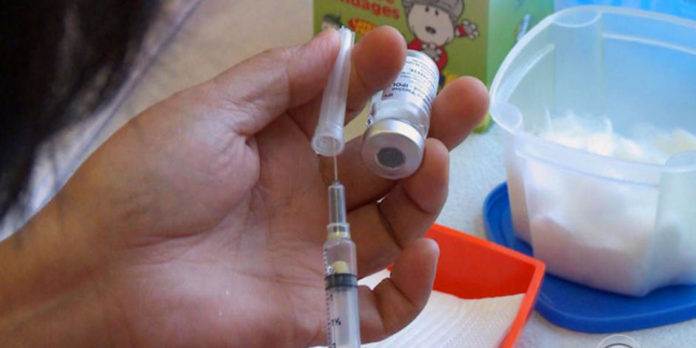
As a measles outbreak linked to Disneyland continues to spread across the country, federal health officials are warning that the growing number of unvaccinated U.S. residents could undo years of progress against vaccine-preventable diseases.
CDC Director Dr. Thomas Frieden said in an interview with CBS’s Face the Nation on Sunday that he was “very concerned” about the possibility of a large outbreak and said the best way to prevent the disease is with vaccinations he called “safe and effective.” He cited a lack of vaccinations for the resurgence of a disease that the CDC said was eliminated in the U.S. in 2000.
“What we’ve seen is, as over the last few years, a small but growing number of people have not been vaccinated. That number is building up among young adults in society, and that makes us vulnerable,” Dr. Frieden said. “We have to make sure that measles doesn’t get a foothold in the U.S. It’s been actually eliminated from this country for 15 years. All of our cases result, ultimately, from individuals who have traveled and brought it back here.”
According to the latest CDC figures, at least 102 cases have been confirmed in in 14 states, most of which have been linked to a December outbreak that started at Disneyland in Anaheim, California. Almost all of those infected with the virus were not vaccinated against it.
Nationally, childhood measles vaccination rates have hovered around 92 percent for years. That’s nearly enough for what’s known as “herd immunity”: in order for any vaccine to be effective, you need to have a certain percentage of people in a population immunized. This means diseases can’t spread through populations very easily, and it protects even those who aren’t vaccinated. For a highly contagious disease like measles, the threshold for herd immunity is around 90 to 95 percent.
But the moment measles vaccination rates fall below that critical threshold, the disease can find enough hosts to spread in the community. That’s what happening right now, as measles is taking hold in communities where clusters of under-immunization have compromised herd immuity. In California, 11 percent of kindergarten students — about 13,000 children — have not been vaccinated against measles, and that figure rises to more than 60 percent at some private schools in the state.
Some parents don’t vaccinate their children because they are unaware of the threat posed by measles, Dr. Frieden told Face the Nation. “They just may not recognize that measles is still with us, that it’s serious,” he said.
But other parents are part of a growing anti-vaccination movement fueled in large part by a 1998 study by Andrew Wakefield in the British medical journal The Lancet, which claimed to have found evidence of a link between the MMR (measles-mumps-rubella) vaccine and autism. Those claims have now been entirely discredited, and The Lancet retracted the study in 2010 after an investigation determined that Wakefield had fabricated and falsified his data.
Additionally, in 2010, British medical officials took away Wakefield’s medical license for major ethical lapses, including conducting invasive and unnecessary medical procedures on children. Wakefield was also cited for undisclosed conflicts of interest — as it turns out, his attempt to discredit the MMR vaccine coincided with a move to patent his own rival vaccine and test kits, as part of a deal which some reports claim could have made him a millionaire.
Unvaccinated children put others at risk, including children who can’t be vaccinated and those who have immune problems, said Dr. Frieden. “What you do for your own kids doesn’t just affect your family— it affects other families as well,” he said.
